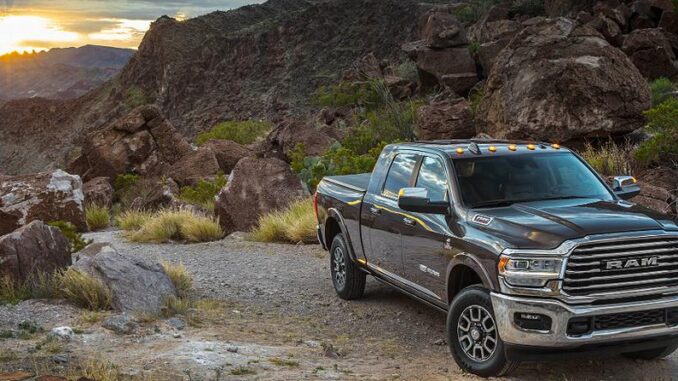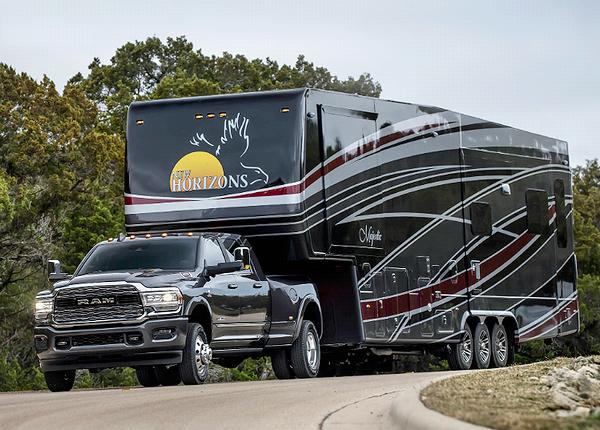
COLUMBUS, Indiana, December 31, 2023 (ENS) – Installing emissions defeat devices on hundreds of thousands of engines over the past decade will cost engine manufacturer Cummins Inc. $1.675 billion to settle claims that it violated the Clean Air Act, the U.S. Justice Department has announced. The $1.675 billion penalty is the largest civil fine for a Clean Air Act violation and the second largest environmental penalty ever assessed in the United States.
The Clean Air Act requires vehicle and engine manufacturers to ensure that their products comply with applicable emission limits. Defeat devices are parts or software that bypass, defeat, or render inoperative emissions controls such as emission sensors and onboard computers.
Cummins allegedly installed defeat devices on 630,000 RAM 2500 and 3500 pickup truck engines from model years 2013 to 2019.
The company also allegedly installed undisclosed auxiliary emission control devices on 330,000 model year 2019 to 2023 RAM 2500 and 3500 pickup truck engines, for a total of nearly one million engines altered by the unlawful installations.
“The Justice Department is committed to vigorously enforcing the environmental laws that protect the American people from harmful pollutants,” Attorney General Merrick Garland said on December 22 in connection with this case.
“Today, the Justice Department reached an initial agreement with Cummins Inc. to settle claims that, over the past decade, the company unlawfully altered hundreds of thousands of engines to bypass emissions tests in violation of the Clean Air Act.”
“As part of the agreement, the Justice Department will require Cummins to pay $1.675 billion, the largest civil penalty we have ever secured under the Clean Air Act, and the second largest environmental penalty ever secured.”

“The types of devices we allege that Cummins installed in its engines to cheat federal environmental laws have a significant and harmful impact on people’s health and safety,” Attorney General Garland said.
“In this case, our preliminary estimates suggest that defeat devices on some Cummins engines have caused them to produce thousands of tons of excess emissions of nitrogen oxides. The cascading effect of those pollutants can, over long-term exposure, lead to breathing issues like asthma and respiratory infections,” Garland said.
Cummins, a publicly-traded company, said in a December 22 statement that “the company has cooperated fully with the relevant regulators,” and has “already addressed many of the issues involved…”
“Cummins conducted an extensive internal review and worked collaboratively with the regulators for more than four years. The company has seen no evidence that anyone acted in bad faith and does not admit wrongdoing,” the company said.
The company has already recalled model year 2019 RAM 2500 and 3500 trucks and has initiated a recall of model years 2013 through 2018 RAM 2500 and 3500 trucks. Cummins says the company has racked up a total of $59 million for the estimated costs for executing these and other related recalls.
Cummins expects to record a charge of $2.04 billion in the fourth quarter of 2023 to resolve these and other related matters involving approximately one million pick-up truck applications in the United States.
Of this amount, $1.93 billion relates to payments that are expected to be made in the first half of 2024. The balance reflects Cummins’ best estimate of related expenses that will impact future cash flow. “The company is in a strong financial position with existing liquidity and access to capital to satisfy obligations associated with the settlements, support ongoing operations, and execute its growth strategy,” Cummins said.
In conclusion, Attorney General Garland said, “Violations of our environmental laws have a tangible impact – they inflict real harm on people in communities across the country. This historic agreement should make clear that the Justice Department will be aggressive in its efforts to hold accountable those who seek to profit at the expense of people’s health and safety.”
Featured image: RAM 2500 truck, model year 2019 (Photo courtesy Hagerty Insurance)
© 2023, Environment News Service. All rights reserved. Content may be quoted only with proper attribution and a direct link to the original article. Full reproduction is prohibited.



